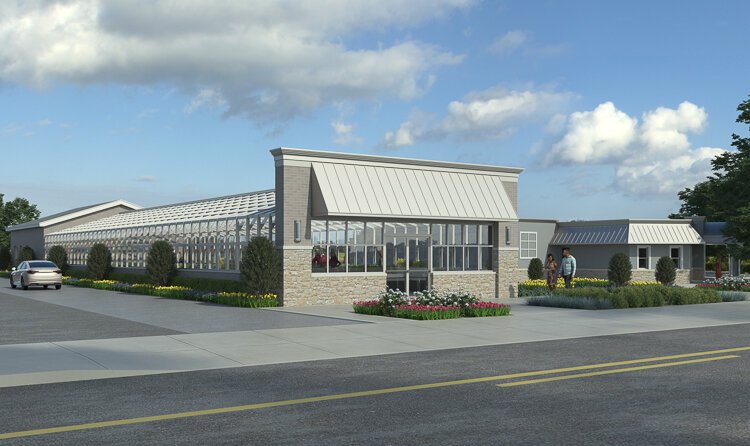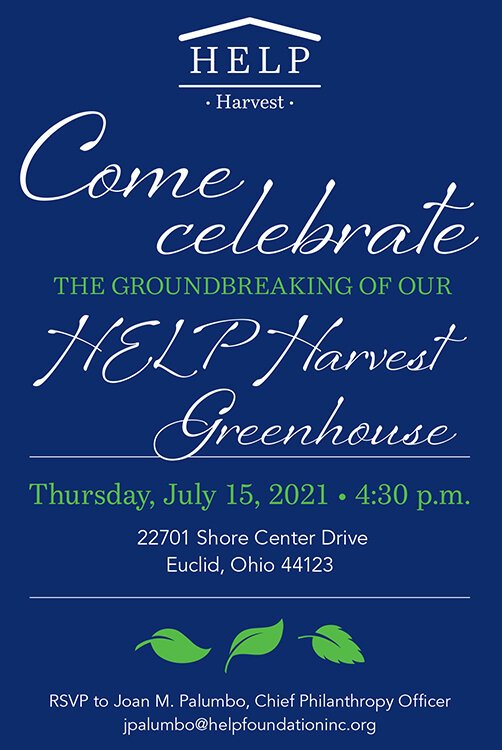HELP is planting the seed for a hydroponic greenhouse in downtown Euclid
 Courtesy of HELP HarvestHELP Harvest Greenhouse rendering
Courtesy of HELP HarvestHELP Harvest Greenhouse rendering
What do catering, shredding, and hydroponic growing have in common? They’re all part of HELP’s “path to employment” for people with intellectual and developmental disabilities via vocational habilitation and employment services. Set to break ground this Thursday, July 15, a 3,000-square-foot hydroponic greenhouse will be the newest addition to the mix.
“We’re not necessarily teaching them how to be farmers or work in a greenhouse,” says Tami Honkala, president and CEO of HELP. “Our focus is to teach life skills and employment skills that will be transferable to any job in the community.”
Located in downtown Euclid, the HELP Harvest Greenhouse will accomplish just that by providing both paid employment and on-the-job training in growing hydroponic crops and fresh produce. An on-site classroom will also offer educational programming on topics related to successful community employment (such as time management, socialization and resume building). In the future, HELP also plans to partner with Euclid High School’s urban agriculture program and nearby Urban Renaissance Farms.
As Honkala envisions it, participants will receive vocational training in the greenhouse for 12-18 months before moving on to long-term community employment elsewhere. “A vocab program is meant to be a training program, so we encourage them to keep moving along the path,” says Honkala, who has been with HELP for 33 years. “I believe everyone should be able to work in the community where they live; we want to give the people we’re blessed to serve every opportunity we can.”
 Once the greenhouse is up and running, the food grown will be utilized at the Lakewood-based HELP Harvest Kitchen, where participants learn basic culinary skills and prepare food for local bakeries, senior programs, and Lakewood Concessions. HELP will also operate a grab-and-go café at the forthcoming Cleveland Foundation headquarters in Midtown, offering seasonal “seed-to-table” food items and providing jobs for greenhouse “graduates.”
Once the greenhouse is up and running, the food grown will be utilized at the Lakewood-based HELP Harvest Kitchen, where participants learn basic culinary skills and prepare food for local bakeries, senior programs, and Lakewood Concessions. HELP will also operate a grab-and-go café at the forthcoming Cleveland Foundation headquarters in Midtown, offering seasonal “seed-to-table” food items and providing jobs for greenhouse “graduates.”
“Everything grown at the greenhouse will be harvested and used in the kitchen to be sold at this café,” explains Honkala. “Any extra produce [that isn’t used at HELP Harvest Kitchen or the café] will go to local restaurants, food banks, and farmers markets.”
HELP is working with Madison-based Arcadia GlassHouse to construct the state-of-the-art greenhouse with a goal of completion by January 2022. Honkala is particularly excited about the concept of hydroponic growing—citing an extended growing season, easier maintenance, water conservation, and higher-quality produce among the reasons hydroponics made sense for HELP Harvest Greenhouse.
“Initially, we were going to have regular pots and plants, but after touring some different programs, we decided to redesign our growing space to be 100% hydroponic,” says Honkala. “We believe it’s the wave of the future.”
While the HELP Harvest Greenhouse is future-focused, it’s also strongly rooted in the past. For over 25 years, HELP provided services for the TAL Consortium, formed by three Madison-based families who came together to purchase a house and enlist HELP’s services in caring for their daughters Terri, Annie, and LuAnne. When LuAnne Green passed away in 2018, her family donated a portion of her protected trust to HELP, and the seed for the greenhouse (or “Green” house) was planted.
“The Green family had been the largest farming family going back generations in Madison,” explains Honkala. “We thought a greenhouse would be a perfect way to further their legacy and continue serving people with disabilities for years to come.”

